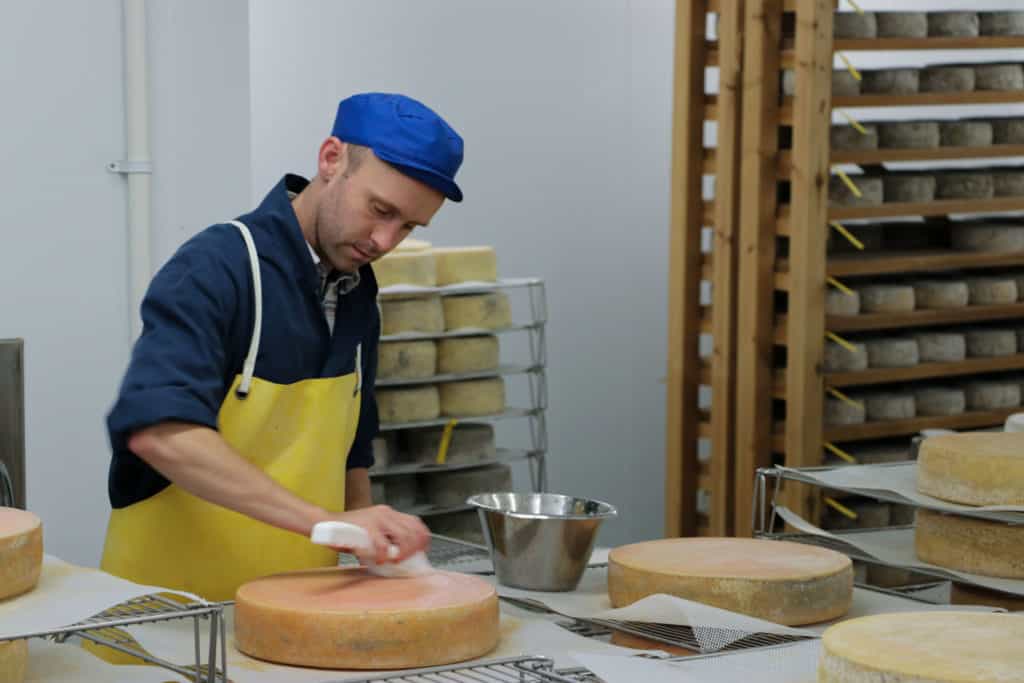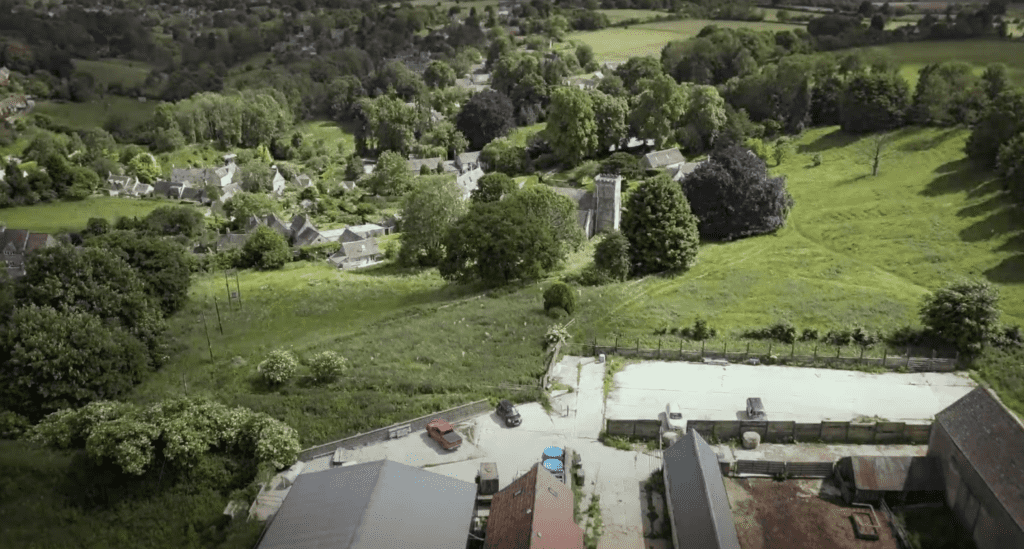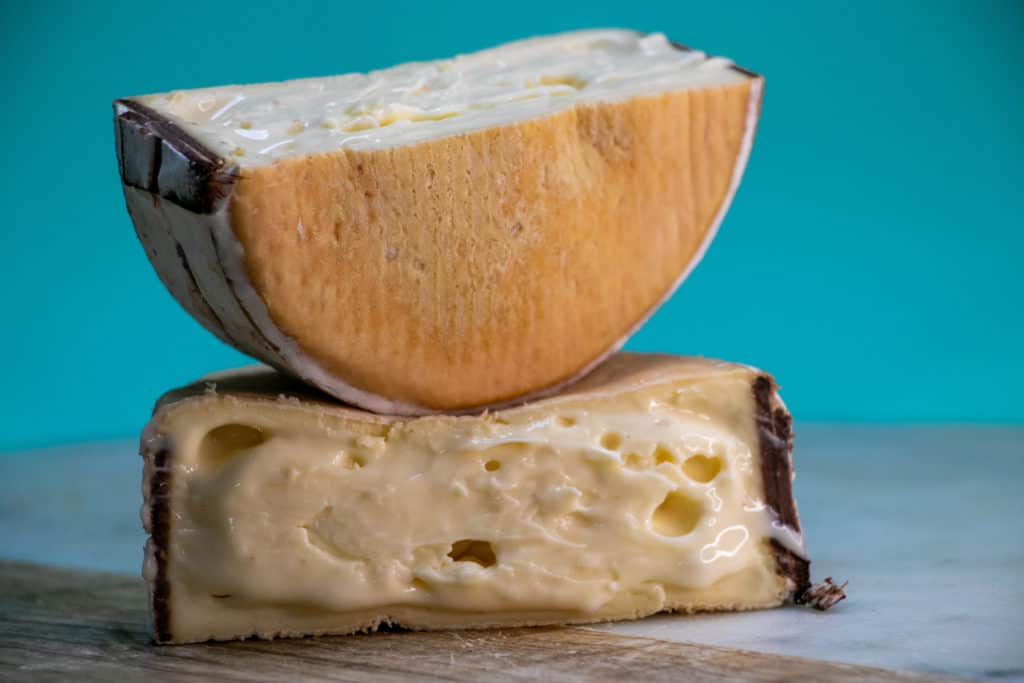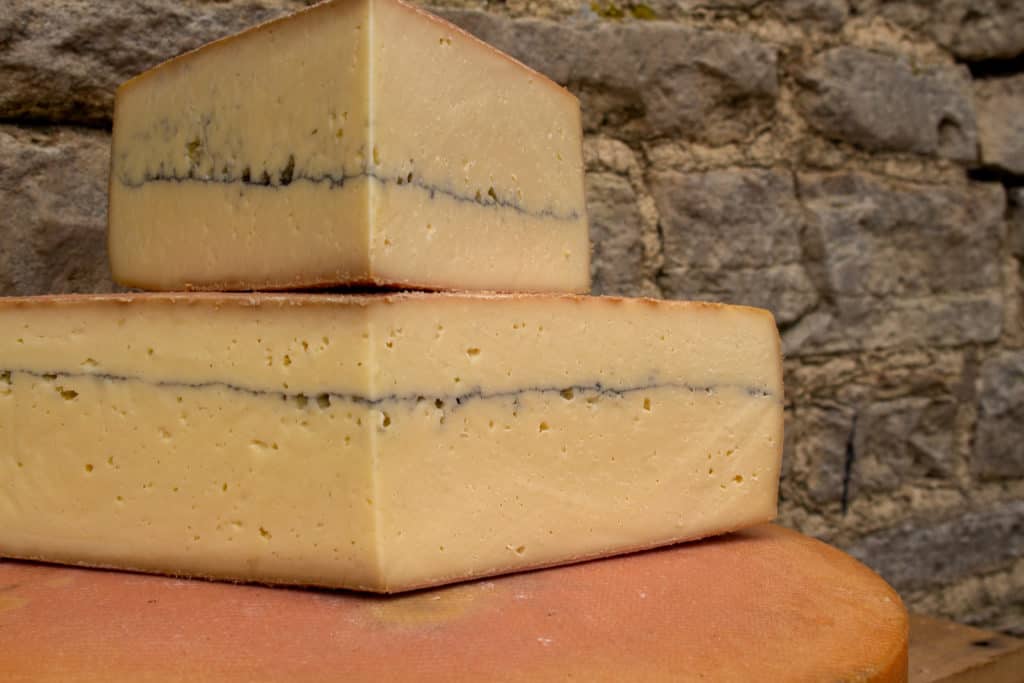
Arriving at King Stone Dairy, set within the gentle roll of the Cotswolds hills, you’re greeted by the muted barking of a dog. The noise comes from within the dairy—a modern addition to the collection of weathered wooden barns that make up Manor Farm. Glinting trophies from cheese competitions crowd the dairy’s window.


Within its clean surrounds, David Jowett—the dairy’s 31-year-old owner and chief cheesemaker—introduces his three-year-old border terrier, Bertie. “We bought him during the pandemic,” Jowett says as he settles the dog in its open-top cage, adding apologetically, “no puppy schools were open.”
It was one of the more minor issues that Jowett would have to navigate during the great global disruption. A year or so before many of us had even learned of the existence of Wuhan, King Stone Dairy was on a roll. Its flagship Rollright cheese had just secured a silver medal at the World Cheese Awards—the latest ribbon in a five-star general’s chest of accolades for the popular vacherin-style wheel.
These delicious spruce-bound rounds had migrated to Murray’s Cheese in New York City, and by May 2019 the time was ripe for expansion. The move to Manor Farm had already been agreed upon, and in a few months Jowett would leave his premises close to the neolithic standing stones which had given the dairy its name and relocate 20 miles south. There, he intended to double production to around 50 tons per year. “The plan was to find the best milk possible for our cheeses,” Jowett recalls, “on a farm that could accommodate the growth of our business.”
By the start of 2020, King Stone Dairy’s new creamery was up and running. In those first three months, Jowett and his team threw themselves into the production of soft cheese.
And then all the restaurants closed.
Rising from the Ashcombe
Recalling that period, the slightest cloud passes across Jowett’s fresh-faced countenance. “This is the support dog,” he laughs, pointing at Bertie in his cage. “At the time, we’d just spent half a million on the building and, suddenly, 80 percent of our customers had disappeared.”
With a vast quantity of soft cheese, and a window of only eight weeks until it hit maturity, the clock was ticking. As the reality of the situation dawned not only on Jowett but the industry in general, key players intervened. In the case of Britain’s artisan cheesemakers, celebrity chef Jamie Oliver led the campaign that helped clear King Stone Dairy’s backlog.
Prompted by a social media push to support them, Oliver, along with several other high profile figures in the UK food world, promoted the “Save British Cheese” selection boxes created by London-based cheesemonger Neal’s Yard Dairy. Bolstered by Oliver’s huge social media following, the Save British Cheese boxes helped clear 6,000 Little Rollrights over a 10-day cheese-selling bonanza.
And while King Stone Dairy managed to ride out that period of financial turbulence with a short-term loan from the government, the episode had demonstrated to Jowett the risky nature of his business model. “It had shown us the precarity of making, pretty much, one cheese, and that cheese being soft ripening,” he says. “If for whatever reason the demand has a shock to it, we’re pretty screwed pretty quickly.”
The creamery was also feeling the squeeze from its milk supplier. With a forecast amount of milk to be purchased from the farm, and penalties attached for defaulting on the agreement, Jowett and his team had to act fast.
It was time to develop a new cheese. But what? With cash flow limited, making a cheddar and aging it over the course of a year was out of the question. Jowett settled on a cheese with a three-to-four-month profile, something that, with a dash of ingenuity, could be produced in King Stone’s existing soft cheese vats.
Raclette was an option. But, as an “ingredient cheese,” sold at a relatively low price, it wasn’t a sound commercial choice for a small dairy operating on top quality organic milk. Eventually, over a contemplative Easter lunch, Jowett decided on a Morbier-style cheese. The original hails from Comté country in France’s Jura mountains. It’s a sizable 11-pound, washed rind wheel that dwarfs King Stone Dairy’s other cheeses.
Supreme comeback
King Stone’s first Ashcombes appeared midway through 2020. Even though Jowett describes his flagship, Rollright, as a “finickity cheese to get right,” Ashcombe is the cheese in his stable that he considers the most technically complex. The process involves washing the cheese in a brine solution that produces a savory, meaty terracotta-hued rind.
Despite its complexity, the flavor of the cheese is mellow. The line of wood ash running through the middle is not razor straight, but uneven like a Geiger read-out detecting tremors. The pliable paste is rich and smooth, with notes of hazelnuts and melted butter.
Tasting Ashcombe, it’s humbling to think that while the rest of the UK’s population in lockdown was struggling to maintain a sourdough culture, wilting houseplant, or even a patchy beard, Jowett was developing an award-winning cheese. Adding to the difficulty was the fact that, with the gears of trade seized up, he and his team had to make do with inadequate equipment: vats that were designed for soft cheese, and no cheese press. But the greatest challenge, Jowett explains, was in how to “manipulate the blend of thermophilic, mesophilic, and secondary cultures to get what we want.”
For Jowett, a graduate of the UK’s School of Artisan Food and a man who clearly relishes cheesemaking’s technical tinkering, it perhaps was little surprise when, debuting Ashcombe at the UK Artisan Cheese Awards in mid-2021, it was crowned Supreme Champion.
While that was a deserved reward for Jowett’s hard work, it was perhaps more poetic in October 2022, at the first British Cheese Awards to be held since the pandemic, when this wheel-born-of-adversity bagged its second Supreme Champion accolade.
“Cheesemakers faced unimaginable challenges during the lockdowns, forcing them to innovate in all sorts of ways to survive,” said the chairman of the awards, Julius Longman. “Ashcombe embodies this beautifully as it was produced in direct response to the need to store a sudden glut of milk in a larger, longer-aging cheese. David and his team created something extraordinary in the process—a very worthy winner of the British Cheese Awards 2022 trophy.”
Now, two-and-half years into making Ashcombe, King Stone is finally investing in equipment fit for the purpose. Second-hand vats are making their way across the Atlantic from Jasper Hill Farm in Vermont, while French-made equipment tailored for the creamery’s needs are traversing the English Channel.
In addition to the new cheese, what has also emerged is a stronger, more resilient cheesemaker. Jowett is even tailoring his milk supply, bolstering the British Friesians and Dairy Shorthorns that were already grazing the unique herbal lays of Manor Farm’s bucolic acres with more cheese-friendly breeds such as Brown Swiss, Montbeliards, and Jersey. “It’s all entirely the result of the pandemic,” Jowett says. “Were the business not put through what it was, then Ashcombe wouldn’t exist.”






